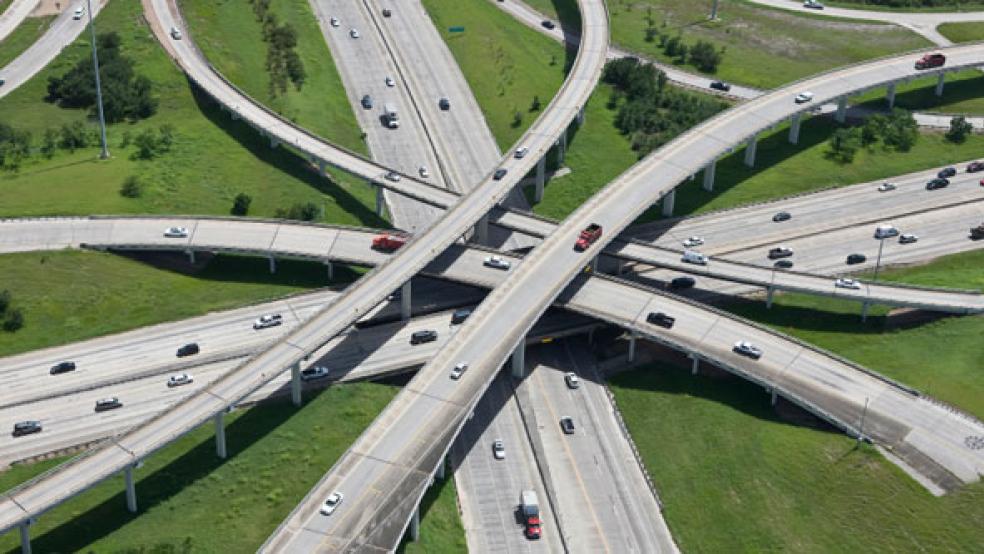Amid signs that at least a quarter of the states are suffering from sharp declines in highway construction employment, the latest bipartisan effort on Capitol Hill to approve a new, multi-year transportation program appears to be crashing and burning.
Just a day after Senate Majority Leader Mitch McConnell (R-KY) and Sen. Barbara Boxer (D-CA) jointly unveiled a new six-year surface transportation bill to provide the states with more funding and greater certainty in moving ahead with major infrastructure projects, a top House GOP leader declared the bill would not be considered by the House before Congress leaves for the August recess.
Related: McConnell and Boxer Offer a Grab Bag of Gimmicks to Pay for Highways
“I don’t see the Senate [bill] flying in the House,” House Majority Leader Kevin McCarthy (R-CA) told reporters outside the Republican National Committee headquarters Wednesday. “This idea of a Senate bill coming together in a last minute that’s not long term, that’s not paid for… I think brings real doubt to a lot of people,” McCarthy said. The topic was discussed at a closed GOP meeting Wednesday in the Capitol Hill Club.
The $50 billion deal unveiled by McConnell and Boxer, the ranking Democrat on the Senate Environment and Public Works Committee, would finance highways, bridges and other infrastructure for the next three years while putting the onus on the next Congress to come up with funding for an additional three years. With McConnell and others ruling out an increase in the 18-4 cents per gallon federal gasoline tax to replenish the Highway Trust Fund, McConnell and Boxer proposed a grab bag of budget gimmicks and maneuvers to offset the cost, including cutting dividends paid by the Federal Reserve to member banks and eliminating Social Security benefits for people with outstanding warrants for their arrest.
The House last week approved a modest five-month extension of the existing highway authority to give members more time to create a long-term replacement. But McConnell and Boxer say they are tired of years of kicking the can down the road and want a long-term solution before Congress leaves for its August recess. “Enough is enough,” McConnell told reporters yesterday.
Related: Why Congress Can’t Make a Deal on Highway Spending
McCarthy, the No. 2 Republican in the House, didn’t completely rule out the Senate bill, saying a conference negotiation was possible. “There’s ways to deal with it. You can go to conference. We can do ours,” he told reporter. However, passage of the McConnell-Boxer bill in the Senate will be problematic at best.
Yesterday, Democrats blocked procedural action to begin deliberations of the bill after Minority Leader Harry Reid complained that Democrats hadn’t been given adequate time to review the bill. Conservatives have also threatened to torpedo the bill if McConnell makes good on his promise to bring up reauthorization of the Export-Import Bank as an amendment to the highway bill.
Governors, state highway officials, business leaders and highway advocates have long complained of repeated delays in reauthorizing the federal transportation program, warning that important infrastructure projects are being delayed and local economies are missing important job-generating projects.
Related: Highway Funding Could Be Backdoor to Corporate Tax Reform
A new analysis of Labor Department data by the Associated General Contractors of America shows construction employment declined in 25 states between May and June even as 39 states and the District of Columbia added construction jobs. Association officials noted that the monthly construction employment declines come as Congress continues to search for ways to pay for new highway and transit investments.
Illinois was hardest hit, with the loss of 4,700 construction jobs or a 2.2 percent reduction during the past month, according to the analysis. Illinois was followed by New Jersey, which lost 4,600 jobs; Ohio, which lost 3,700 jobs; and Florida, which lost 3,100.
"While the year-over-year totals remains relatively positive, the monthly construction employment figures are troubling," said Ken Simonson, the association's chief economist. "Investing in transportation infrastructure will make it easier for many firms involved in highway and transit construction to add new staff."





